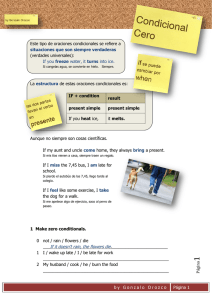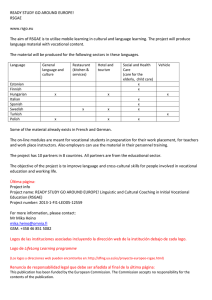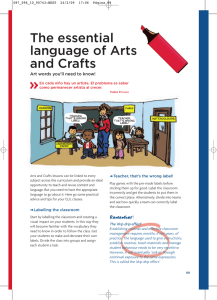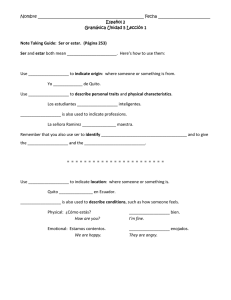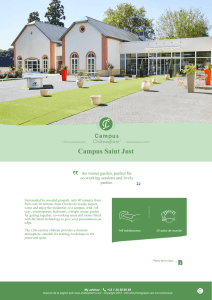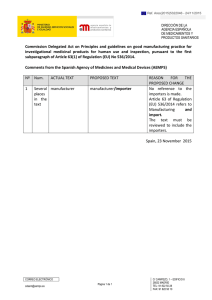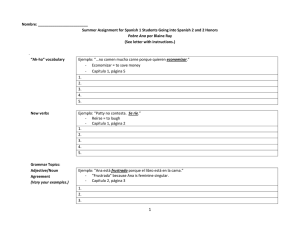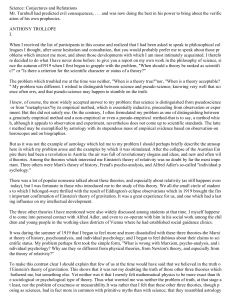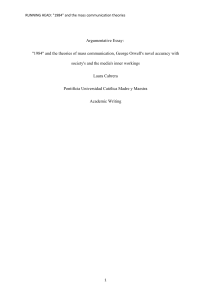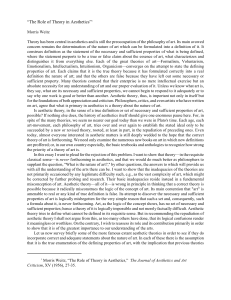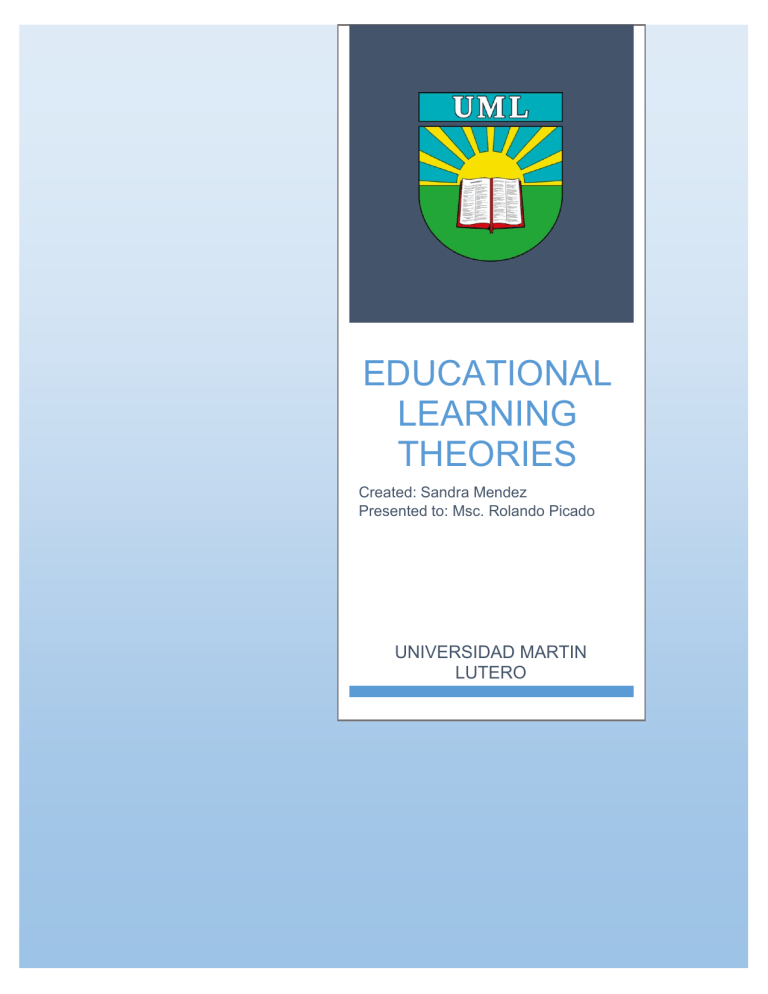
EDUCATIONAL LEARNING THEORIES Created: Sandra Mendez Presented to: Msc. Rolando Picado UNIVERSIDAD MARTIN LUTERO Educational Learning Theories -S. Mendez Content The Five Educational Learning Theories ................................................................................. 2 1. Behaviorism ............................................................................................................................ 2 2. Cognitivism ............................................................................................................................. 4 3. Constructivism ....................................................................................................................... 6 4. Humanism ................................................................................................................................ 7 5. Connectivism .......................................................................................................................... 9 Bibliography .................................................................................................................................. 11 Página 1 de 11 Educational Learning Theories -S. Mendez The Five Educational Learning Theories There are 5 overarching paradigms of educational learning theories; 1. Behaviorism, 2. Cognitivism, 3. Constructivism, 4. Design/brain-based, 5. Humanism 6. 21st century skills. 1. Behaviorism is a view in which behavior can be explained by external factors and behavioral conditioning can be used as a universal learning process. In behaviorism, the ideas of positive and negative reinforcement are effective tools of learning and behavior modification, as well as a punishment and reward system. 1. Concept: Behaviorism is a worldview that operates on a principle of “stimulus-response.” All behavior caused by external stimuli (operant conditioning). All behavior can be explained without the need to consider internal mental states or consciousness. 2. Contributors John B. Watson Ivan Pavlov B.F. Skinner E. L. Thorndike Albert Bandura 3. Key concepts Behaviorism is a worldview that assumes a learner is essentially passive, responding to environmental stimuli. The learner starts off as a clean slate (i.e. tabula rasa) and behavior is shaped through positive reinforcement or negative reinforcement[2]. Both positive reinforcement and negative reinforcement increase the probability that the antecedent behavior will happen again. In contrast, punishment (both positive Página 2 de 11 Educational Learning Theories -S. Mendez and negative) decreases the likelihood that the antecedent behavior will happen again. Positive indicates the application of a stimulus; Negative indicates the withholding of a stimulus. Learning is therefore defined as a change in behavior in the learner. Lots of (early) behaviorist work was done with animals (e.g. Pavlov’s dogs) and generalized to humans. Behaviorism precedes the cognitivist worldview. It rejects structuralism and is an extension of Logical Positivism. 4. Radical behaviorism Developed by BF Skinner, Radical Behaviorism describes a particular school that emerged during the reign of behaviorism. It is distinct from other schools of behaviorism, with major differences in the acceptance of mediating structures, the role of emotions, etc. 5. Example: In order to encourage the use of good study strategies, students need to see the direct consequence of using them. One way to do this is to give them practice using their own strategies and then require them to study some small bit of material using the new strategy you are teaching. The immediate and direct feedback that shows a higher grade is a positive reinforcement. Página 3 de 11 Educational Learning Theories -S. Mendez 2. Cognitivism The cognitivist paradigm essentially argues that the “black box" of the mind should be opened and understood. The learner is viewed as an information processor (like a computer). 1. Concept: Mental function can be understood. 2. Contributor: Marriner David Merill (1937 – ) Charles Reigeluth (1946 – ) Robert Mills Gagné (1916 – 2002) Jerome Bruner (1915-2016) Roger Schank (1946 – ) 3. Key concepts: Cognitivism focuses on inner mental activities — opening the “black box” of the human mind. It is necessary to determine how processes such as thinking, memory, knowing, and problem-solving occur. People are not “programmed animals” that merely respond to environmental stimuli; people are rational beings whose action are a consequence of thinking. Metaphor of mind as computer: information comes in, is being processed, and leads to certain outcomes. 4. Example: activities that will make your student apply logic, creativity, and close examination on the spot to produce an answer. Cognitive learning essentially relies on five principles: remembering, understanding, applying, evaluating, and creating. Remembering: Creating a timeline of important events from memory, Make a game of reciting poetry or important writings, Writing a paragraph or blurb detailing what they remember from last class. Página 4 de 11 Educational Learning Theories -S. Mendez Understanding: Defending a point of view, or debate, Creating a list of examples, Classifying types of processes or events. Applying: Have the students create an effective learning game themselves, solve problems or answer questions listed on the board, Have students demonstrate procedures in front of class. Evaluating: Constructing a graph to illustrate certain information, Having students develop a questionnaire to group or gather information at hand, Creating a pros and cons list Creating: Write an original poem, Perform or write a scenario demonstrating themes or illustrating specific ideas, write a manual or guidebook demonstrating important information. Página 5 de 11 Educational Learning Theories -S. Mendez 3. Constructivism is the idea that people are responsible in creating their own understanding of the world and using what they know based on previous experiences in the process of linking new information to these experiences. People use these experiences and new information to construct their own meaning. 1. Concept: The learner is an information constructor. 2. Contributor: Lev Semyonovich Vygotsky (1896 – 1943) Jean Piaget (1896 – 1980) John Dewey (1859 – 1952) Jerome Seymour Bruner (1915 – 2016) 3. Key concepts: Constructivism states that learning is an active, contextualized process of constructing knowledge rather than acquiring it. Knowledge is constructed based on personal experiences and hypotheses of the environment. Learners continuously test these hypotheses through social negotiation. Each person has a different interpretation and construction of knowledge process. The learner is not a blank slate (tabula rasa) but brings past experiences and cultural factors to a situation. 4. Example: Having students working together and aiding to answer one another's questions. Allowing students to work in groups or pairs and research controversial topics which they must then present to the class. Página 6 de 11 Educational Learning Theories -S. Mendez 4. Humanism focuses on the individual as the subject and asserts that learning is a natural process that helps a person reach self-actualization. Scenarios and role modeling are important factors in humanistic learning, as are experiences, exploring and observing others. 1. Concept: Humanism is a paradigm/philosophy/pedagogical approach that believes learning is viewed as a personal act to fulfill one’s potential. Emphasis on the freedom, dignity, and potential of humans. Learning is a personal act to fulfill one’s potential. 2. Contributors Abraham Maslow Carl Rogers Malcolm Knowles 3. Key concepts: Humanism, a paradigm that emerged in the 1960s, focuses on the human freedom, dignity, and potential. A central assumption of humanism, according to Huitt (2001), is that people act with intentionality and values. This is in contrast to the behaviorist notion of operant conditioning (which argues that all behavior is the result of the application of consequences) and the cognitive psychologist belief that the discovering knowledge or constructing meaning is central to learning. Humanists also believe that it is necessary to study the person as a whole, especially as an individual grows and develops over the lifespan. It follows that the study of the self, motivation, and goals are areas of particular interest. In humanism, learning is student centered and personalized, and the educator’s role is that of a facilitator. Affective and cognitive needs are key, and the goal is to develop self-actualized people in a cooperative, supportive environment. 4. Examples: In discovery education, the teacher introduces a concept and gives the student freedom to discover her own path to learning more about the concept. This strategy supports the concept of multiple intelligences and Página 7 de 11 Educational Learning Theories -S. Mendez intellectual diversity. Abstract learners may seek books and computers to research the concept. The interpersonal personality may seek out others to question for information on the topic. Página 8 de 11 Educational Learning Theories -S. Mendez 5. Connectivism is a relatively new learning theory, developed and based upon the idea that people process information by forming connections. This theory has developed with the digital and technology age, adapting to advances in these arenas. This new theory suggests that people no longer stop learning after formal education and continue to gain knowledge from other avenues such as job skills, networking, experience and access to information with new tools in technology. 1. Concept: Connectivism is driven by the understanding that decisions are based on rapidly altering foundations. New information is continually being acquired. The ability to draw distinctions between important and unimportant information is vital. The ability to recognize when new information alters the landscape based on decisions made yesterday is also critical 2. Principles of connectivism: Learning and knowledge rests in diversity of opinions. Learning is a process of connecting specialized nodes or information sources. Learning may reside in non-human appliances. Capacity to know more is more critical than what is currently known Nurturing and maintaining connections is needed to facilitate continual learning. Ability to see connections between fields, ideas, and concepts is a core skill. Currency (accurate, up-to-date knowledge) is the intent of all connectivist learning activities. Decision-making is itself a learning process. Choosing what to learn and the meaning of incoming information is seen through the lens of a shifting reality. While there is a right answer now, it may be wrong tomorrow due to alterations in the information climate affecting the decision. Página 9 de 11 Educational Learning Theories -S. Mendez 3. Examples: Blogs are a powerful tool in the world of eLearning. You can use them to keep your online learners updated on important events, or even embed a calendar that reminds them of upcoming due dates and eLearning assessments. Try to post at least once a week to get your online learners thinking about a specific topic and offer supplemental online learning resources they can use to expand their understanding. Página 10 de 11 Educational Learning Theories -S. Mendez Bibliography https://www.educationdegree.com/articles/educational-learning-theories/. https://es.slideshare.net/Kholekha/cognitive-learning-theory-5953309 https://explorable.com/cognitive-learning-theory https://www.learning-theories.com/ Página 11 de 11

